Posted: November 11th, 2014 | Author: Matt | Filed under: personal | Tags: best-of, books, personal | No Comments »
This has been an interesting year in reading for me. I read a lot of books, about 65. I didn’t track them all, but I reviewed 25 books for Publishers Weekly, read 6 books in manuscript form, Â 3 books for the Texas Book Festival panel I moderated in October, 6 books for our book club at work, and I got about 10 other books for free (review copies). I checked out 140 books at the library so far this year, but many of those were children’s books or books which I read only a portion of. Â Several of the books I reviewed will not be published until 2015 and many of the books I read for personal pleasure were published in years past. I’m not counting those for this list, but if I did, the blue-ribbon would go to Reif Larsen’s I am Radar. I’ll save that one for 2015. Here are some of the best things I read this year, published in 2014.
1. The Bone Clocks by David Mitchell
This was probably my most-anticipated book of the year. And I found it fairly disappointing. The first three fifths of the novel were excellent and Mitchell had me in thrall, gliding along on the expectation of a tight conclusion. But I could not find the urge to care enough about the science fiction angle of a supernatural battle. The first section, about Holly Sykes, sort of goes off the rails when Holly discovers a brutal murder caused by some sort of spirit or apparition. But I stuck with it for the next section, which is centered around Hugo Lamb. The story of his pursuit of Holly in a Swiss ski resort is expertly told, Mitchell at his best.
2. 10:04 by Ben Lerner
This, along with the Mitchell novel, was at the top of my list for 2014 novels. I adored Lerner’s first novel and had high hopes for his Atocha-Station-set-in-NY and there are parts of this book that are fantastic, but overall, I didn’t feel that the book had the narrative coherence Lerner was able to establish in Atocha Station.
3. My Struggle, volume 1, by Karl Ove Knausgaard
4. Women by Chloe Caldwell
5. Sister Golden Hair by Darcey Steinke
6. Fancy by Jeremy Davies
7. The Smartest Kids in the World by Amanda Ripley.
Honorable Mentions: The David Foster Wallace Reader, Dallas 1963 by Bill Minutaglio and Steven L. Davis
Posted: November 11th, 2014 | Author: Matt | Filed under: personal | Tags: 88thDivision, army, Belan, Bucher, bugler, family, LSB, WWI | 1 Comment »
This Veteran’s Day I find myself thinking of a man I never met: my great-grandfather Leo Steven Bucher. He was born in 1890 in Berlin, Germany, and died in 1955 in Dallas, Texas. His parents were named Paul and Elisabeth Belan, and they emigrated to the US in December 1901. They settled in Chicago, working menial jobs in factories and restaurants, but Leo escaped. Sometime between 1906 and 1907 he jumped on a freight train and began tramping around the United States. (I’m condensing some of this story here.) In 1908 he fell ill while riding a train across northern Missouri and hopped off near a tiny town called Powersville. There he was sheltered and raised by a childless couple: Reuben T. and Alice A. Bucher. The Buchers formally adopted Leo at the age of 21 and he went into business with his adopted father: R.T. Bucher & Son. Together they owned several businesses in Powersville including a mercantile, a Sinclair filling station, and a restaurant. Reuben was active in the small Masonic lodge in Powersville and had his son initiated into the lodge in 1913. (In 1905, Reuben and Alice Bucher helped form Order of the Eastern Star Chapter #278 in Powersville, Missouri. They were both charter members and Alice was installed as the Chapter’s first Associate Matron.)
From 1914-1916 Leo Steven attended Chillicothe Business College (in Missouri) and the N.E. Missouri State Teacher’s College (now called Truman State University) in Kirksville, Missouri, studying business and mathematics.
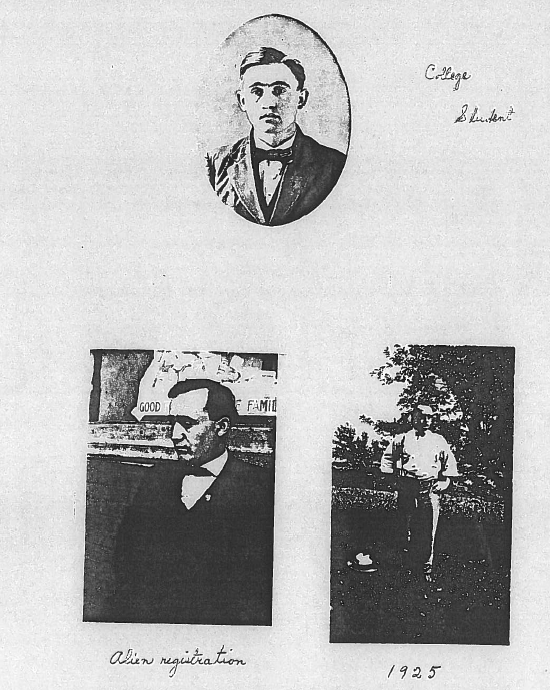
The United States formally declared war on Germany on April 6, 1917. One month later President Wilson enacted a draft, requiring all males age 21-30 to register for service. Leo Steven Bucher was drafted into the US Army on June 5, 1917. He was sent to Camp Dodge, Iowa, but was sent back to Powersville because he was still a German citizen. He was not allowed to enlist and was thrown in jail. The problem was he had no proof of legal US residency, only an alien registration card and his adoption papers. His adopted father Reuben intervened on his behalf and after several tense days he was released and allowed to enlist before the next expansion of the draft. Leo S. Bucher officially entered the army on May 25, 1918. He was conveniently made a US citizen at the Polk County Court House in Des Moines on June 13, 1918.

[courtesy of David Bucher]
At Fort Dodge, Leo S. Bucher (above, in uniform) was given the rank of Bugler, at that time equivalent to Private. Here is his Infantry Drill Regulations manual which outlines the duties of the Bugler and includes sheet music for different calls.
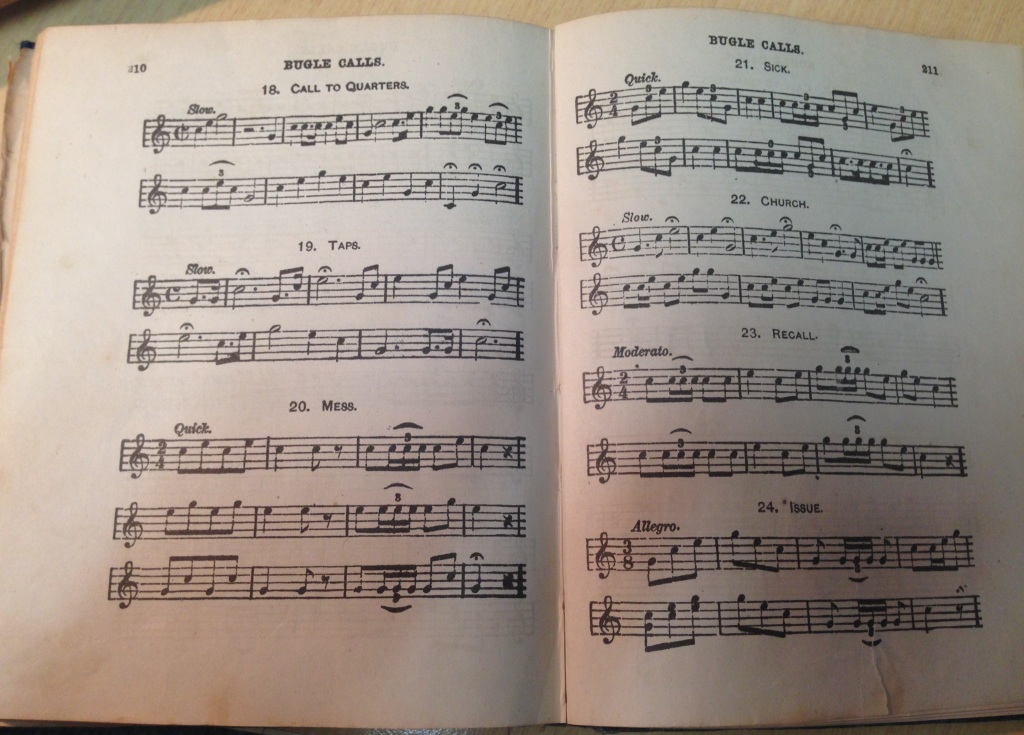
[courtesy of James Bucher]
Here is his bugle:
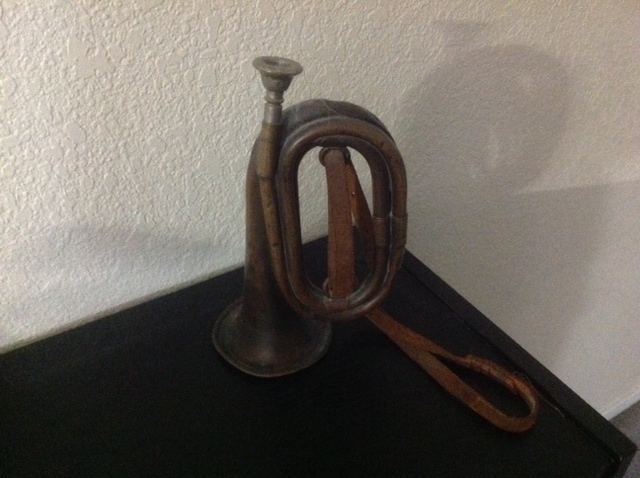
[courtesy of David Bucher]
The soldiers at Camp Dodge were almost all residents of Iowa and northern Missouri. They were part of the Army’s 88th Division and Leo was assigned to C Company, 351st Infantry, 88th Division (Clover Leaf Division) “ part of the AEF, American Expeditionary Force. There is an excellent history of the 88th Division in World War I here:
http://distantcousin.com/Military/wwi/units/usa/88thDivision/index.html
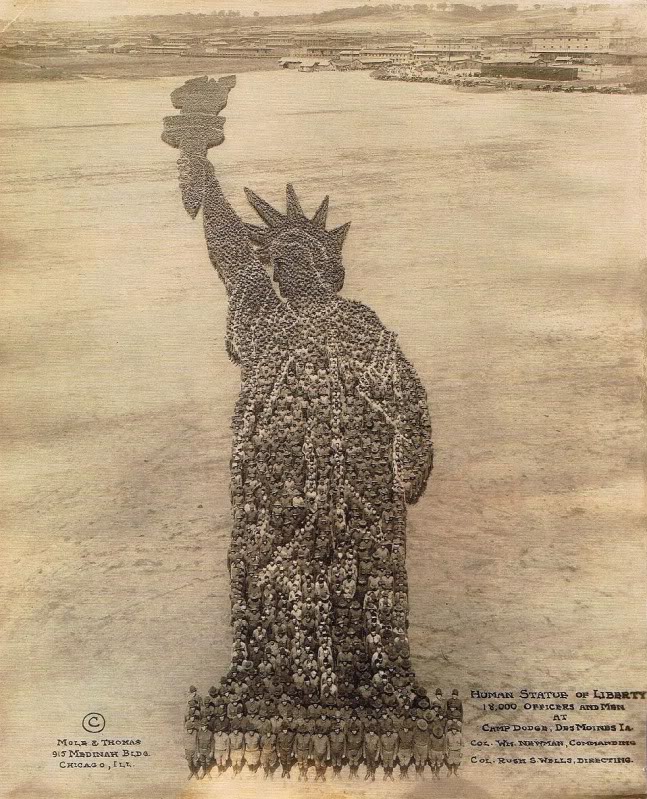
[Human Statue of Liberty – 18,000 officers and men at Camp Dodge, Des Moines, IA, courtesy of Wikipedia]
Company C shipped out to France on August 16, 1918, arriving in Le Havre on September 4. The Division moved by rail from Le Havre to Semur, Cote d’Or, and then to Belfort, France, freeing up the 29th Division to capture enemy artillery positions in the area. In October 1918 Leo was wounded by bomb shrapnel outside of Gommersdorf, France (Southern Sub-Sector) and recovered at a nearby farmhouse. By the time he returned to the 351st Infantry at Belfort, armistice had been declared (November 11 – 96 years ago today) and the war was over. The 88th Division spent the next nine months in France demobilizing, training, attending schools, playing sports, staging plays, and preparing for their return to the United States.
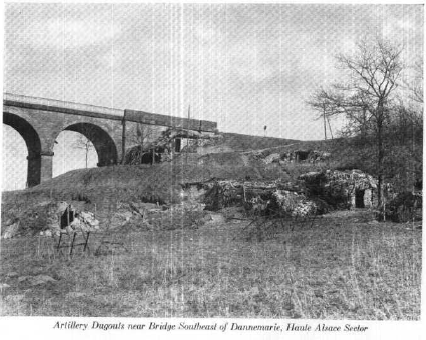
Near the end of their demobilization, the 88th Division spent several weeks in Paris sightseeing and celebrating. I am fortunate to have with me a postcard that Leo Steven Bucher sent to his father Reuben from Paris:
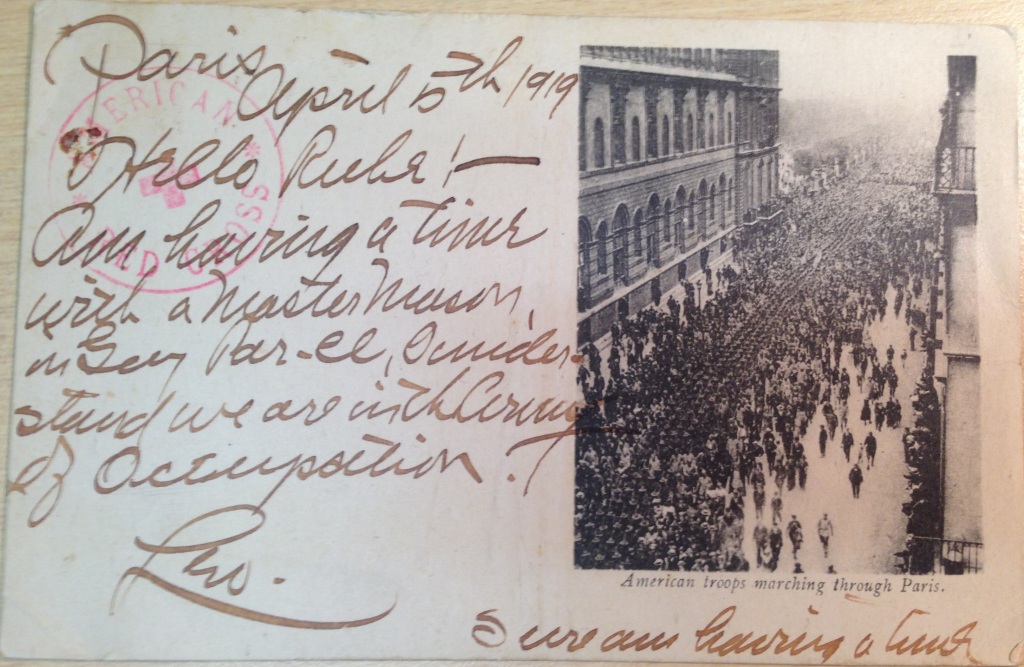
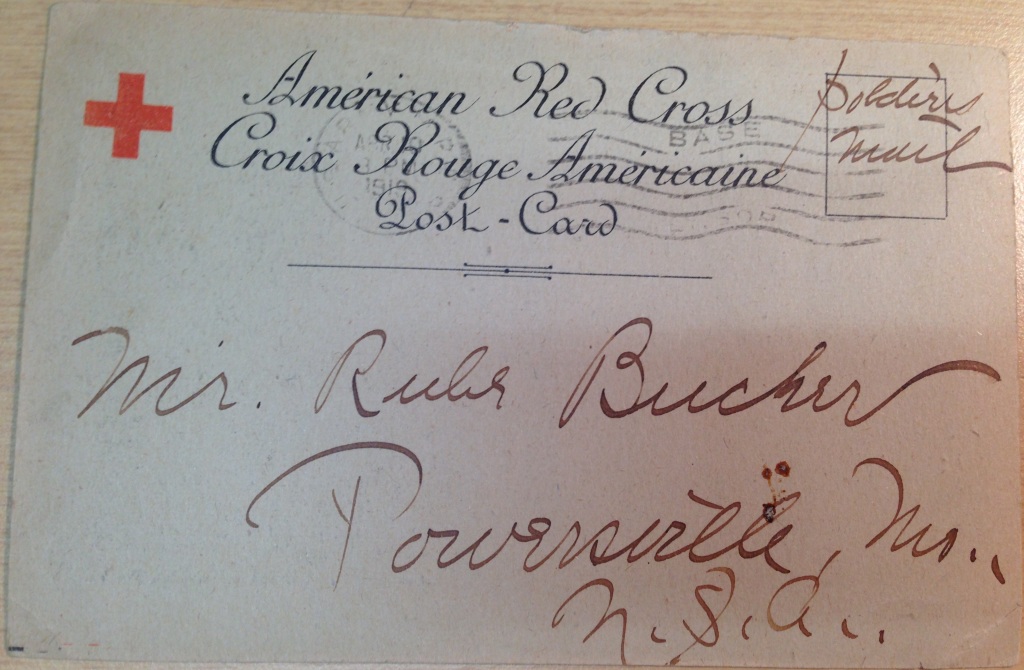
[Paris, April 5th, 1919
Hello Rube!
Am having a time with a Master Mason in Gay Par-ee! Understand we are in the Army of Occupation.
Leo.
Sure am having a time]
He returned to the United States on May 31. On June 9, 1919, he was formally discharged from the military at Camp Zachary Taylor in Louisville, Kentucky. {The novelist F. Scott Fitzgerald also trained at Camp Zach Taylor and mentions it in The Great Gatsby.}
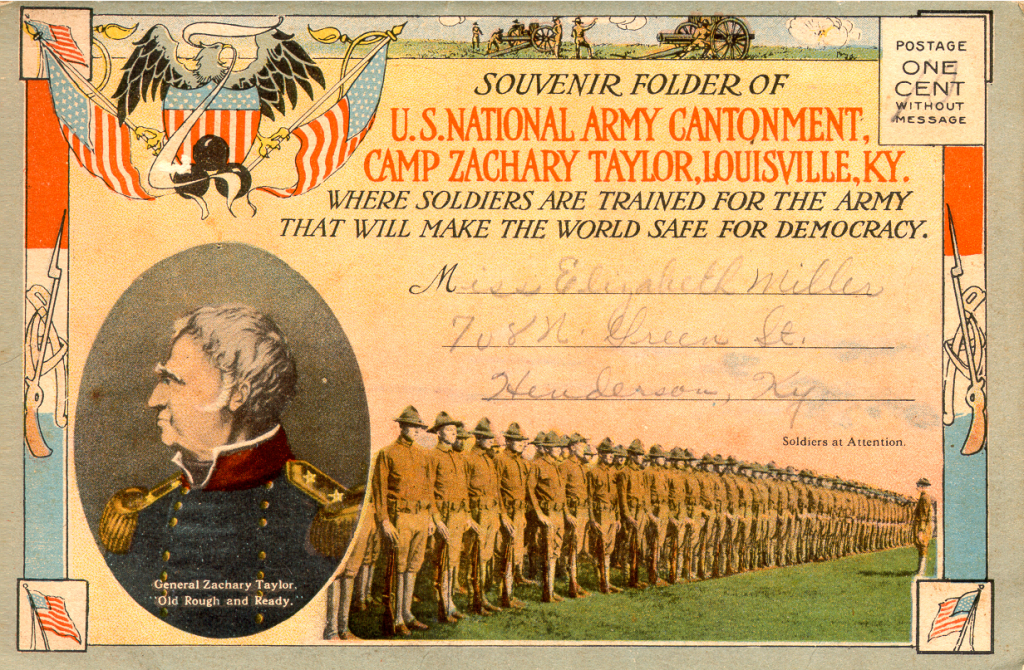
After he returned to Powersville, he met a young Iowa girl named Mary and the two were married in Centerville, Iowa, on May 20, 1924. He was 33, she was 23. They had three children: David Reuben, born 1925, Alice Allene, born 1926, and my grandfather, Leo Warren, born 1929. Reuben entered the Army in March, 1943 and after 20 years service in the medical corps, he was discharged in 1963. Leo Warren entered the Army on November 5, 1950 at Fort Hood, Texas, and was discharged November 28, 1951 at Camp Polk, Louisiana. He served in the 193rd Heavy Tank Battalion.
There is much more to the story of Leo Steven Bucher and I am working on a longer project about his life. But today I wanted to remember him as a war veteran.










